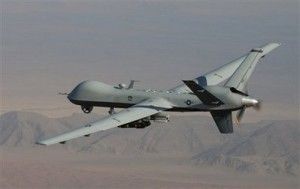US Confirms Libya Predator Strike
The US military has confirmed the first strike by an unmanned Predator drone aircraft in Libya.
Nato said the drone destroyed a Libyan government multiple rocket launcher near Misrata at approximately 1100 GMT.
Drones can hit military targets more easily in urban areas, minimising the risk of civilian casualties.
Earlier, Libya's government warned that tribes loyal to Col Muammar Gaddafi might take over the fight against the rebels in the western city of Misrata.
The deputy foreign minister said the Libyan army was being withdrawn and suggested that the tribes would not show the same level of restraint over civilian casualties.
But a rebel military spokesman in Benghazi said Col Gaddafi was "playing games" and would not allow his forces to leave Misrata.
Human rights groups say more than 1,000 people have died there.
Bunker
Several hours after the Pentagon's announcement confirming the Predator strike, Nato revealed that the target had been a "Gaddafi regime multiple rocket launcher (MRL) in the vicinity of Misrata".
"The MRL system had been used against civilians in Misrata," the alliance said in a statement.
Predators have previously been used in Libya only for intelligence, surveillance and reconnaissance missions.
On Thursday, Defence Secretary Robert Gates said President Barack Obama had approved air strikes in support of the Nato-led mission because that was where the US had "some unique capabilities".
Gen James Cartwright, the vice-chairman of the US Joint Chiefs of Staff, said forces loyal to Col Gaddafi were digging in or "nestling up against crowded areas" to avoid being targeted by Nato warplanes.
The more precise Predators bring "their ability to get down lower and therefore, to be able to get better visibility, particularly on targets that have started to dig themselves into defensive positions," he added.
The BBC's Peter Biles in Benghazi says the first drone attack in Libya could mark the start of a new phase of Nato's air campaign.
It is certainly a further attempt to protect civilians who are under attack from Libyan government forces, our correspondent adds.
Click here to read more.


